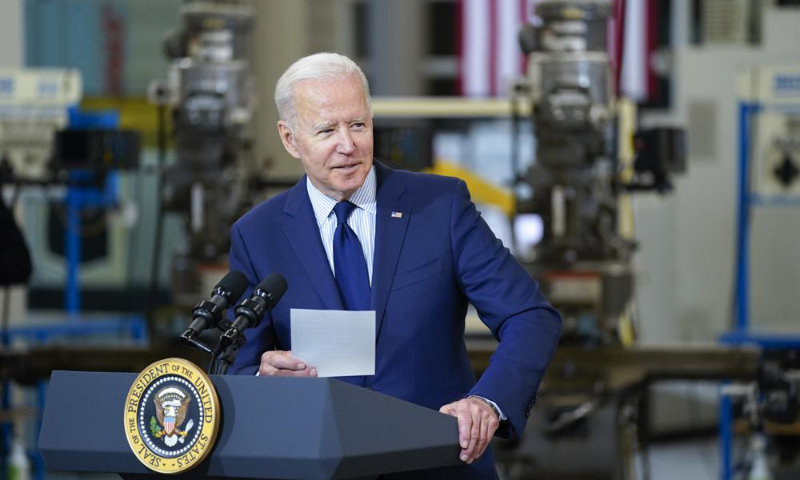WASHINGTON: In its first budget, for fiscal year 2022, the Biden administration also seeks money for providing economic and social support to Pakistan and for training Pakistani military personnel.
On Friday, President Joe Biden unveiled the largest US budget in history — seeking $6 trillion for fiscal 2022. The budget calls for a 16 per cent increase in non-defence spending, mainly in social programmes and infrastructure projects.
The overall defence budget request of $715 billion — indicates a decline of about 3pc in real terms from the current year as Afghanistan, Iraq drawdowns cut $3.2bn from the US Army costs.
Congress told funding for Pakistan will support governance and tackle extremism
The budget still asks for $3.3bn in operational support to sustain the Afghanistan Security Forces, a 9.2pc increase from 2021.
The US State Department’s budget proposals for foreign operations and related programmes also include requests for Pakistan.
“Funding for Pakistan will support strengthened democratic governance, particularly near the Afghan border in Khyber Pakhtunkhwa province; address the drivers of violent extremism and support stability in Afghanistan and expand economic growth, including by bilateral trade and investment where possible,” said the proposal the department sent to Congress on Friday.
Funds for these programmes will come from the $324.5 million the department is seeking for South and Central Asia.
The requested funds’ core US security objectives across South Asia include supporting peace and stability in the region, addressing the challenges of climate change, supporting the economic recovery from Covid-19, and revitalising US alliances and partnerships.
“Regional activities for South Asia will strengthen transparent governance and civil society participation, promote private sector growth, support energy generation, and expand trade, including across the Afghanistan and Pakistan border,” the State Department informs Congress.
The department is also seeking $13.8m for its International Military Education and Training (IMET) programmes in South and Central Asia, which “support US priorities for the region, by focusing on professionalising the defence forces of regional partners, emphasising professional military education. Priority recipients include Pakistan, Bangladesh, India and Nepal”.
Although IMET is a small budget programme, it enhances coordination between US Armed Forces and those of friendly nations.
Washington had excluded Pakistan from this programme but in January 2020, the Trump administration resumed the training facility.
“To strengthen military to military cooperation on shared priorities & advance US national security, the President of the United States authorised the resumption of IMET for Pakistan. The overall security assistance suspension for Pakistan remains in effect,” the announcement added.
The IMET programme was suspended in 2018, after Pakistan and Russia signed an agreement to allow Pakistani military officers to receive training in Russian military institutions.
In May 2018, Washington suspended most of its security aid, delivery of military equipment and transfer of security-related funds to Pakistan after claiming that Pakistan provided safe haven for terrorists in Afghanistan, which Islamabad had denied.
However, in July 2019, the US approved $125m to provide Pakistan with technical support for its fleet of F-16 aircraft, after Prime Minister Imran Khan’s first official visit to Washington.
In recent statements, US officials and lawmakers have once again showed interest in reviving their ties with Pakistan. They are also seeking ground and air access to Afghanistan from Pakistan after the withdrawal of their troops by Sept 11, 2021.
Defence Secretary Lloyd Austin said at a budget hearing this week that the US withdrawal from Afghanistan was slightly ahead of schedule.
“I can report to you today that the retrograde is proceeding on pace, indeed slightly ahead of it,” he said.
He did not offer further detail on the drawdown, but the Pentagon said earlier this week that the drawdown was “somewhere between 16 to 25pc complete”.
The Pentagon, however, also said that the United States will continue to have a presence in the Central Command area of responsibility, which includes Pakistan. The US will also continue to have a diplomatic relationship with Afghanistan, he added.
Published in Dawn, May 30th, 2021














































